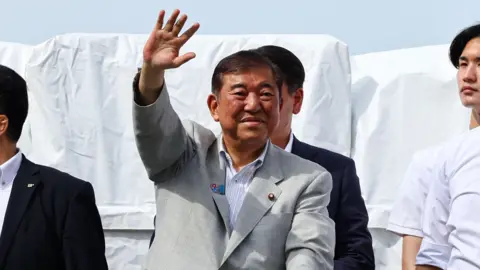Tokyo correspondent
 Gety pictures
Gety picturesExit from the reconnaissance funds from the elections in Japan, the ruling coalition is scheduled to lose its majority, putting the country’s Prime Minister Chiju Ishiba under tremendous political pressure.
The voters went to opinion polls earlier on Sunday due to the elections of the Supreme House of Representatives that were tightly tested, which were kept amid general frustration due to high prices and the threat of American customs tariffs.
After it has already lost its majority at the lower home in Japan, the defeat of the coalition in the Senate would undermine its impact on policy -making and can drive Ishiba to quit less than a year after its election.
The coalition needs 50 seats to retain the control of the 248 -seat Alawite room – with a survey of the NHK public broadcaster who exposes them to win between 32 and 51.
Previous opinion polls have indicated that the Liberal Democratic Party in Ishiba (LDP) and its novice partner Communo were in the risk of losing their majority, after they lost their majority in the most powerful parliament in Japan.
On Sunday, NHK expected, “It might be difficult for the ruling coalition to preserve its majority.”
Half of the seats were voted in the upper room in Sunday elections, with members election for six years.
If the coalition occupies less than 46 seats, it will form its worst performance since its formation in 1999.
Ishiba has ruled in the center in the center almost continuously since 1955, albeit with repeated changes in the leader.
The expected result emphasizes the frustration of voters from Ishiba, who fought to inspire confidence while Japan is struggling against economic opposite winds, the cost crisis and commercial negotiations with the United States.
Many are also not satisfied with inflation – especially the price of rice – and a series of political scandals that have been inciting the liberal Democratic Party in recent years.
The last of the three years of LDP, who lost a majority in the House of Representatives, fell within two months, and analysts expected that a significant loss in these elections would result in a similar result.
This would open this field for a potential leadership trade by other prominent members of the National Democratic Party, including Sanae Takaichi, who ranked second to Ishiba in the general elections last year; Takayuki Kobayashi, former Minister of Economic Security; Cengero Koizumi, son of former Prime Minister Junishiro Koizumi.
However, changing leadership within the ruling party is certainly unleashed into political drama and destabilizing the government of Japan at a pivotal moment in the United States and Japan trade negotiations.
 Reuters
ReutersThe support of the ruling coalition appears to have been eroded by the right -wing Sansito Sansito party, which attracted conservative votes with “First Japanese”, its anti -immigration speech.
For the first time, Sanseito acquired YouTube during the Covid-19s, where it published conspiracy theories about vaccines and a group of global elites.
The National Party’s national discourse expanded its call before Sunday, as policies related to the foreign population and migration became a pivotal point in the campaigns of many parties.
Exit from NHK exit surveys, on its way to win seven seats.
The island’s nation is famous for its isolation culture and strict immigration policies, and has witnessed a record increase in both tourists and foreign population in recent years.
The flow led to an increase in the prices of the Japanese people and nourished a feeling among some that foreigners benefit from the country, which is exacerbated.
At the same background, ISHIIBA launched a work squad last week aimed at addressing “crimes or inconvenience behaviors committed by some foreign citizens”, including those related to immigration, land acquisition and unpaid social insurance.
https://ichef.bbci.co.uk/news/1024/branded_news/eef2/live/55395a80-63c3-11f0-b78c-6b951187ffbf.jpg
2025-07-20 13:18:00














